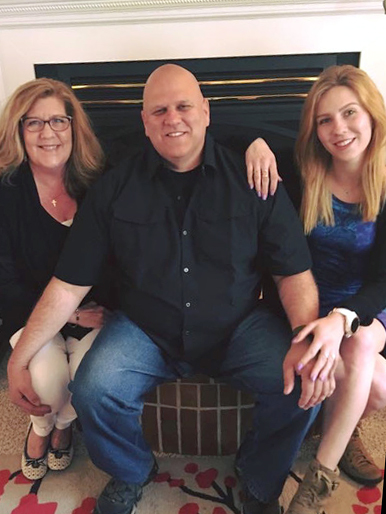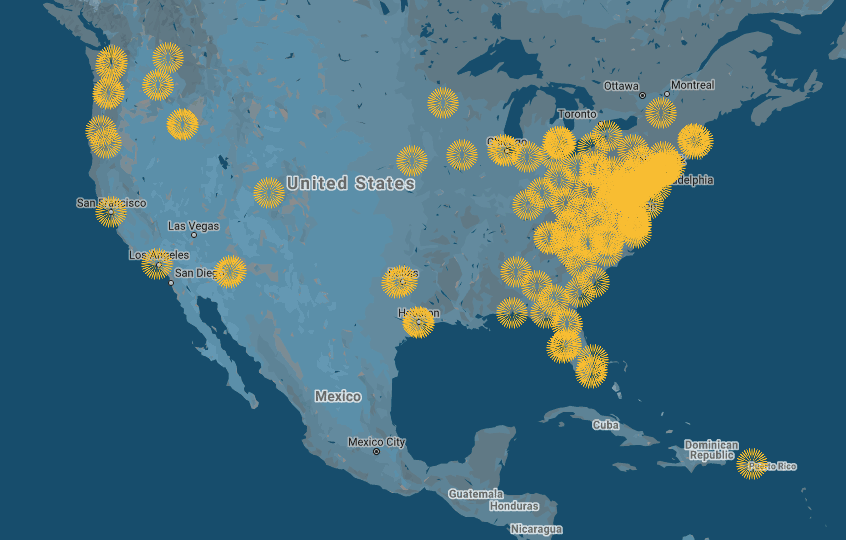Latest News
Research
Two decades and an immeasurable impact: The Palliative Care Program at Massey celebrates its 20th anniversary
May 26, 2020

“There’s nothing more important in those times than managing the pain,” recounted Joe Strohman, who lost his wife, Dianne, to cancer on November 10, 2018. Two years earlier, Dianne was diagnosed with an extremely aggressive form of sarcoma in her leg, followed by the discovery of another rare form of cancer in her liver. In the two years following her diagnosis, she endured multiple surgeries, months of chemotherapy, 90 radiation treatments and the amputation of her leg nearly to her hip. Pain was an enduring reminder of the disease.
Joe and Dianne met when he was in the Marines and stationed at Camp Lejeune in North Carolina in 1989. She owned a chiropractic clinic where Joe started going for back pain near the marine base. They were married for 27 years and had a daughter, who is now 24. In 2017, what they thought were fatty tumors in her legs turned out to be cancer.
“Every time we were in the hospital, which was a lot, Hope would show up out of nowhere. She was like a magical elf; she must have noticed Dianne’s name in a system and would always check in to see if we were okay,” said Joe. “If Dianne was in any kind of discomfort, Hope would call Bart, and in two minutes he’d be working with her doctors to adjust her medications and make sure she was comfortable. There were times when she was in considerable pain, but those times didn’t last long.”
Felicia “Hope” Coley, R.N., and Bart Bobb, N.P., are two members of the Palliative Care Program at VCU Massey Cancer Center. Palliative care is a specialized form of care focused on relieving suffering and pain in people with chronic conditions such as cancer. Hospice care is a form of palliative care, but while hospice care is focused on end of life, palliative care is often administered from the time of diagnosis alongside curative treatments.
Massey’s Palliative Care Program was formally established on May 1, 2000, with the opening of the Thomas Palliative Care Unit on the fourth floor of North Hospital at VCU Medical Center. The 11-bed inpatient unit was made possible thanks to generous support from the Thomas Hospice Foundation. Among National Cancer Institute (NCI)-designated cancer centers, Massey was one of the first to have an inpatient palliative care unit.
Massey’s program also consists of an inpatient consult service—the same one that served Dianne Strohman—available to any inpatient at VCU Health regardless of diagnosis, as well as an outpatient Supportive Care Clinic, which offers multidisciplinary care to address the physical and psychosocial needs of cancer patients.
 Dianne Strohman is one of nearly 18,300 patients served by Massey’s Palliative Care Program since its inception.
Dianne Strohman is one of nearly 18,300 patients served by Massey’s Palliative Care Program since its inception.
Established by visionaries in palliative medicine, the program quickly became world-renown for its leadership in care delivery, education and research.
“It takes a special person to work in palliative care—to comfort people and show compassion; to take seriously the little things that are important to them; and to support them through whatever life they have left so they can accomplish their goals,” said Joe. “They truly provided care like we were part of their own family.”
Based in Richmond, changing care across the country
Dianne Strohman is one of nearly 18,300 patients treated by Massey’s Palliative Care Program since its inception. Last year, the program served a record 1,765 patients, with 1,515 adult and pediatric inpatient consults and 2,256 outpatient visits. Massey partners with clinicians at the Children’s Hospital of Richmond at VCU to treat pediatric patients.
“Palliative care is about relieving the symptoms associated with illness. These symptoms come in many forms, whether it’s fatigue, nausea, physical pain, psychological distress or emotional or spiritual suffering,” says Egidio Del Fabbro, M.D., director of Massey’s Palliative Care Program, the Palliative Care Endowed Chair, member of Massey’s Developmental Therapeutics research program and professor in the Division of Hematology, Oncology and Palliative Care at the VCU School of Medicine. “Our job is to decrease and help manage those symptoms for our patients so they can focus on the things that are important to them.”
On May 1, 2012, exactly 12 years after the program was established, Del Fabbro was named the director, replacing Thomas J. Smith, M.D., who helped establish the program with help from many others before moving on to Johns Hopkins Sidney Kimmel Comprehensive Cancer Center.
As part of an academic medical center, Massey’s Palliative Care Program focuses on patient care, research and education. In 2002, it began its fellowship program. The fellowship is a one-year program in hospice and palliative care, in which participants receive comprehensive training through direct patient care in a variety of settings in the VCU Health System (VCUHS) and Hunter Holmes McGuire VA Medical Center.
The fellowship program has helped expand palliative care throughout Virginia and beyond, contributing to the careers of many prominent palliative care experts, including the current fellowship director, Danielle Noreika, M.D., who is also medical director of Massey’s Palliative Care Program and associate clinical professor in the Division of Hematology, Oncology and Palliative Care at the VCU School of Medicine. After graduation this June, a total of 54 fellows will have graduated from the program.
 Massey has trained medical providers from 161 hospitals and other health care facilities in the U.S. through the Palliative Care Leadership Center program.
Massey has trained medical providers from 161 hospitals and other health care facilities in the U.S. through the Palliative Care Leadership Center program.
In 2004, Massey was awarded a grant by the Center to Advance Palliative Care (CAPC) and the Robert Wood Johnson Foundation to serve as one of seven original Palliative Care Leadership Centers (PCLC) in the U.S. Today, there are nine PCLCs in the country, all with a mission to train medical professionals on how to establish a palliative care program in a model sustainable for their institution that provides this valuable form of care to patients who need it.
As a PCLC, Massey has helped make palliative care one of the fastest growing specialties in health care. So far, it has trained medical providers from 161 hospitals and other health care facilities in the U.S. and Puerto Rico. Much of the program’s research has focused on creating efficiencies in palliative care delivery, as well as the potential to improve health system patient outcomes.
“One of our goals is to expand access to palliative care, and one of the most effective ways to do that is to provide a model for other institutions to follow,” says Noreika. “Hands-on training is important, but hospitals need to see that they can provide this much-needed care in a sustainable way. We do this by demonstrating the impact of palliative care on patient outcomes, reduced hospitalizations, fewer emergency visits, shorter inpatient stays and other factors that have major impacts on the financial outcomes of health systems.”
In 2006, Massey partnered with a hospice in Northern Virginia to establish the Virginia Initiative for Palliative Care, a state-funded training program designed to provide health care professionals the opportunity to shadow palliative care experts to gain real clinical exposure so that palliative care could be offered at more health care organizations throughout the state. The program is free, and it includes mentoring on an ad hoc basis as well as formal structured observation opportunities to address questions that may arise after leaving the program.
The inception of Massey’s Supportive Care Clinic came six years later in 2012. This interdisciplinary clinic integrates outpatient palliative care with cancer care, is led by board-certified palliative care physicians and currently includes a chaplain, physical therapist, social worker, a specialized psychologist and a palliative care registered nurse, who all work together to assess patients’ physical, psychological, emotional and spiritual needs. The clinic has grown substantially. Originally, it saw patients for one half day a week at Massey’s downtown location. Today, there are nine half-day clinics weekly as well as a smaller telemedicine clinic at VCU Health Community Memorial Hospital in South Hill, Virginia.
Massey’s inpatient palliative care unit provides end-of-life care to any inpatient at VCU Medical Center, regardless of their diagnosis. Since it began in 2000, the service has shown improvements in the number of hospitalizations, symptom scores and advanced care planning. The program even has its very own facility dog, , who joined the team in 2017 and visits palliative care patients throughout the hospital by request with her owner and handler, Jessica Gray, R.N., nurse manager in Massey’s Cellular Immunotherapies and Transplant program.
Due to the COVID-19 pandemic, Massey has temporarily transitioned the majority of its outpatient supportive care appointments to the virtual realm. Thankfully, the team has experience with telehealth to ease the transition.
“While COVID-19 has upended health care in profound ways, our previous experience with telemedicine, I believe, has allowed us to adapt to serve our patients quickly and efficiently,” says Del Fabbro. “Telemedicine is a tool we’ve used to both expand access to palliative care and help train other medical professionals at the same time,” says Del Fabbro.
Noreika regularly consults with colleagues in South Hill and other rural parts of the state to help advise on individual cases. In addition, Massey’s palliative care team also joined Project ECHO (Extension for Community Health Outcomes) at VCU Health. Project ECHO strives to build mentoring-based learning networks that connect subject matter experts to practicing providers, clinicians and health care professionals across Virginia. Through this program, participants can join in virtual ECHO sessions for continuing medical education credits. They can also submit a case study if they are seeking advice on caring for an individual.
With all of their accomplishments, it’s not surprising Massey’s Palliative Care Program has received many awards and accreditations. In 2005, it was one of three in the nation to receive the American Hospital Association’s Circle of Life Award for innovation in palliative care. In 2010, Massey became one of just four cancer centers in the country to receive the European Society for Medical Oncology (ESMO) designation for integration of palliative care and oncology, which was just renewed in 2019. In 2012, the program became the first in Virginia to receive an Advanced Certification in Palliative Care from The Joint Commission in recognition of exceptional patient and family-centered care, and it has continued to hold that certification ever since.
Innovative ways to address timeless problems
“Two of the driving forces behind Massey’s Palliative Care Program are collaboration and innovation,” says Gordon Ginder, M.D., professor in the Division of Hematology, Oncology and Palliative Care at the VCU School of Medicine as well as hematologist-oncologist, member of the Cancer Molecular Genetics research program and the cancer center director at Massey when the Palliative Care Program was established and for most of its existence. “Those qualities are present in the multidisciplinary care they provide, the hands-on education they administer and the research they conduct to improve quality of life in all patients with serious illness.”
 Julianne Capers, with her four sons, now ranging in age from 12-19, was diagnosed with advanced neuroendocrine cancer in 2019.
Julianne Capers, with her four sons, now ranging in age from 12-19, was diagnosed with advanced neuroendocrine cancer in 2019.
Much of the palliative care research at Massey is focused on physical symptoms. For example, Del Fabbro recently received an R01 grant from the NCI to open a study examining testosterone replacement in older male patients to help fatigue. He is leading a different study examining whether melatonin helps fatigue in breast cancer patients receiving radiation therapy. And another R01-funded study jointly conducted by Massey and MD Anderson Cancer Center compares four different types of treatment for delirium, a confused mental state sometimes experienced by patients with advanced cancers.
Other palliative care research that Massey conducts deals with the emotional and spiritual side effects of cancer.
“My grandmother had ALS,” recalled Julianne Capers, a patient of Massey’s supportive care team. “It was such a horrible disease. Our family was always researching new treatments and clinical trials, and when she passed away she asked for her brain to be donated to science. I told myself that if I were ever in a similar situation, I would want to participate in research that might help others.”
Capers’ diagnosis of advanced neuroendocrine cancer came out of nowhere. She woke up early in the morning on January 1, 2019, with excruciating abdominal pain not long after returning from a New Year’s Eve charity gala. When the pain didn’t subside, she went to the ER at VCU Health and was admitted for a week while doctors ran tests to figure out what was wrong.
“After my divorce, I was feeling like I had just gotten my life back on track, and I was excited about the future,” said Capers. “I had gone back to school, gotten a new job as a dental hygienist and my four sons were doing amazing in school and sports. It really came out of nowhere.”
It was the same kind of cancer that former Apple Inc. CEO Steve Jobs had. Capers had a large tumor at the junction of her small and large intestines, as well as metastases in her liver. She immediately began chemotherapy and prepared for surgery in February to remove the tumor in her intestines.
“After surgery, it was a fluid transition to the Supportive Care Clinic,” said Capers. “Whether I was struggling mentally or physically, a different practitioner would come in and help point me in the right direction. I didn’t hesitate when they asked if I wanted to be part of the avatar study.”
Semi Ryu, Ph.D., is an associate professor with joint appointments at the VCU School of the Arts and the Department of Internal Medicine at the VCU School of Medicine. She is an expert in kinetic imaging, the kind used in special effects and animated movies to translate an actor’s movements to a character on the screen. She had been working with residents at a local nursing home, conducting life reviews using a virtual representation known as an avatar so that the residents could reflect on their lives from a different perspective. When she mentioned her work to a colleague at the VCU School of Medicine, he quickly connected her to the palliative care team.
“There is a Korean concept known as ‘Han’ that reflects a paradoxical state of being that combines extreme grief with a great hope for overcoming a seemingly impossible situation,” said Ryu. “Of all of the people with whom I’ve discussed this concept, from philosophers to artists to colleagues at national conferences, the palliative care team knew and understood it the best. It is exactly the scenario that their patients deal with every day.”
Del Fabbro and Ryu received funding from a VCU Pilot Project grant and began recruiting participants. The study was called VoicingHan, and Capers signed up to be one of the 12 participants.
“I’m on two different types of chemo – one that I take every day by pill and another that is administered intravenously once a month,” said Capers. “I have trouble keeping up with the balance. It’s hard to take medicine that makes you feel bad even though you know it could help save your life.”
That’s the “Han,” moving forward for your sons even though the struggle seems impossible.
Capers applied the Velcro-strapped motion sensors and worked with Ryu’s team to design her avatar. The experience lasted about an hour. She progressed through life virtually as her avatar, discussing the past, present and the future while being guided by Ryu.
“Talking about your life in third person was weird at first,” said Capers. “But I think it helped. It forced me to deal with my experience and to be present about it. Just speaking about it out loud was therapeutic.”
Each participant was evaluated before and after the session to assess the impact of the experience on their spiritual and psychological wellbeing, and to see if it helped with symptoms such as anxiety, depression and pain.
“The results from the pilot study were overwhelmingly positive,” said Ryu. “We plan to publish a manuscript on the study soon, and we hope it will help secure funding to move the research to a much larger patient sample size.”
With her liver heavily damaged by the cancer, Capers is now waiting to see if she qualifies for a transplant. She watched her avatar session for the first time recently and has shared bits of it with family, but she has not yet shared it in its entirety.
The future of palliative care at Massey
One of the biggest changes at Massey in the past 20 years is the addition this year of Robert Winn, M.D., as the new cancer center director. Winn is a pulmonologist with expertise in cancer disparities, and he envisions a greater focus on aligning Massey’s priorities with the needs of the communities it serves.
“Dr. Winn adds an exciting focus on bringing the benefits of our care and research directly to the community in new and innovative ways,” said Del Fabbro. “Impacting our community through innovation has always been at the heart of our program, and I think we have a lot to offer.”
Said Winn, “Internationally acclaimed for its leading expertise, stellar patient care and research advancements, Massey’s Palliative Care Program is an incredible resource for our community.”
To better understand barriers to palliative care, J. Brian Cassel, Ph.D., director of palliative care research and member of the Cancer Prevention and Control research program at Massey as well as associate professor in the Division of Hematology, Oncology and Palliative Care at the VCU School of Medicine, is facilitating a two-year pilot study to explore how certain factors, including demographics and social disparities, may affect whether and how cancer patients utilize palliative care. Funded by a $140,000 grant from the American Cancer Society, the findings will be translated into efforts to decrease inequities in quality of care.
A focus on telemedicine will continue to allow Massey to reach patients in rural parts of the state without access to trained palliative care professionals. To help address this issue, the Palliative Care Program is gearing up to shift part of Project ECHO to include non-palliative practitioners.
“We can’t be everywhere at once, but we can share our expertise with physicians who desperately want to help their patients but don’t always have the experience or resources,” says Noreika.
Metabolism and its role in cancer is another focus of the program as it looks toward the future. Massey is poised to open a clinic focused specifically on cachexia, a condition that causes extreme weight loss and muscle wasting in people with chronic disease. Massey will be one of a handful of pioneers in this area, with only three other cancer centers in the U.S. with similar clinics. Research is underway to identify patients with elevated metabolism in hopes of early interventions.
 Pictured is an architectural rendering of the VCU Health Adult Outpatient Pavilion under construction, which includes the outpatient oncology pavilion.
Pictured is an architectural rendering of the VCU Health Adult Outpatient Pavilion under construction, which includes the outpatient oncology pavilion.
In June of 2018, VCU Health broke ground on a new 603,000 square foot outpatient facility – the largest capital construction project in the health system’s history. Included in that facility is a new outpatient oncology pavilion, which will expand and consolidate the majority of Massey’s cancer care downtown. It is expected to be completed in 2021, and it will allow for the expansion of outpatient palliative care services such as the Supportive Care Clinic.
“Massey and VCU Health’s commitment to palliative care, our dedicated team and the incredible philanthropic support we have received has helped our program become one of the best in the country,” says Del Fabbro. “This continued support combined with the incredible expertise of our colleagues throughout VCU and VCU Health and a strong spirit of collaboration have me very excited about our opportunities to make a huge impact in the lives of so many in the coming decades.”
Generous donor support helps our palliative care team continue to provide award-winning support to patients and families facing critical illness. If you would like to make a gift to mark the 20th anniversary, please visit our online giving page and choose Thomas Palliative Care Fund in the drop down box.
Written by: John Wallace
Related News
Research
“We’re aiming for a cure.” Massey and VIMM researchers achieve potential breakthrough in brain cancer treatmentJun 24, 2025
Research
Massey researchers discover new genetic target that could shape the future of liver cancer treatmentJun 23, 2025
Research
Virginia health leaders emphasize community impact, collaboration at Virginia Public Health Summit on CancerJun 10, 2025

Get access to new, innovative care
Treatments in clinical trials may be more effective or have fewer side effects than the treatments that are currently available. With more than 200 studies for multiple types of cancers and cancer prevention, Massey supports a wide array of clinical trials.

Find a provider
Massey supports hundreds of top cancer specialists serving the needs of our patients. Massey’s medical team provides a wealth of expertise in cancer diagnosis, treatment, prevention and symptom management.
